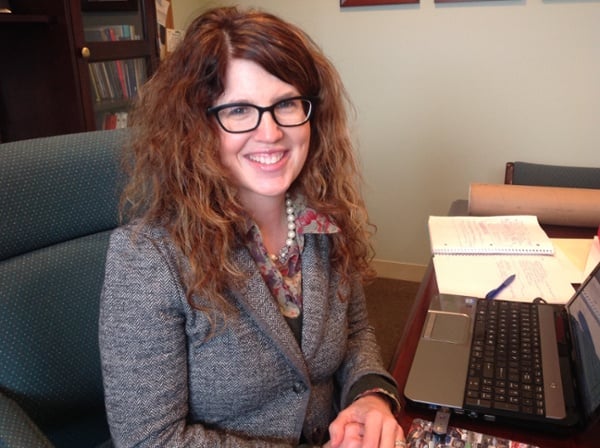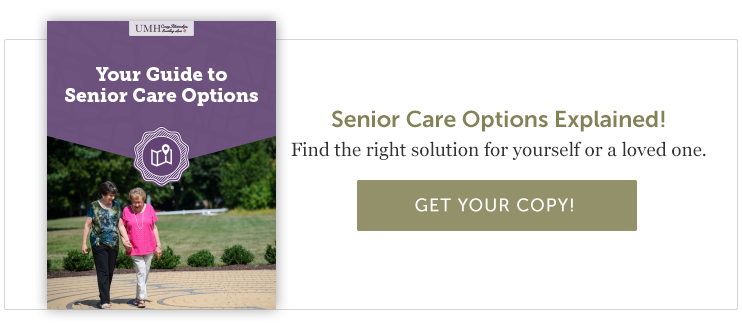Managing Senior Caregiver Guilt Over Nursing Home Placement
caregiver tips | Independent Senior Living | senior living nutrition | senior living homes | Aging & Caregiving | dependent senior living
Guilt, by any measure, is one of the most difficult feelings senior caregivers face when transitioning a loved one from home to a care facility. Family members who find themselves up against this decision do not typically go into it lightly, often laboring over the question of what’s best for the senior in their life. Many times, the move is dictated by unforeseen circumstances or newly emerged medical conditions that make it impractical to care for the loved one at home. Whatever the case, both the decision and the logistics of placement can leave a caregiver riddled with an overwhelming sense of guilt.
Whether the decision to transition your aging loved one to a nursing home happened little by little over some time or quickly in response to sudden health developments, you might be dealing with these feelings of guilt and lost on how to manage them effectively. To support you in coping with this challenging transition of placing your senior loved one in a nursing home, here are some helpful reminders and recommendations about addressing the guilt.
Giving Grace Where Grace Is Due
First and foremost, it is important to stop and acknowledge your feelings. Senior caregiver guilt is completely natural and incredibly common. You’re not the only one who ever faced this decision or life change, and you certainly won’t be the last. So be sure to give yourself grace in this moment. You’re doing the very best you can under trying circumstances, and the decision you’re making is one borne out of love for the senior in your life.
Frequently, guilt is a product of some internal pressure to have done what “should” be done in a given situation. There’s some expectation about what you should be able to handle, how your loved one should be cared for, and what kind of caregiver you should be to them. But these “shoulds” are usually unrealistic and require superhuman capabilities. Every caregiver has their limits, and when the time comes that those limits are exceeded, securing professional care for your aging loved one is one of the best things you can do for them.
Taking Comfort in the Care They’ll Receive
Nursing home residents typically require a constant level of care that family caregivers simply don’t have the time, skill, or capability to provide. This environment is best suited for seniors who don’t necessarily need hospital care but are still unable to live on their own or in an assisted living community. So take great comfort in the fact that your loved one will now have access to skilled nurses around the clock.
Reputable nursing homes are also equipped with necessary supports like lifts to get in and out of bed, showers that are safer and more easily accessible, assistance with essential tasks like eating and dressing, and critical services such as medical care, physical therapy, and speech therapy. And even if your loved one’s level of need is great, there’s still ample opportunity to choose a nursing home dedicated to fostering a warm, comfortable environment with caring staff members and engaging activities.
Researching the Best Fit
One of the most powerful ways to mitigate the senior caregiver guilt you feel over nursing home placement is to gain peace of mind about the residence you’ll ultimately choose for your loved one. Many families begin with online research for options in their community, then make some calls and tour the applicable locations. Most nursing home administrators are happy to speak with families and caregivers directly, answer questions and provide a close-up look at life in their care community.
To prepare for this experience, spend some time listing out your questions and concerns. Have discussions with your family and your aging loved one about what’s most important to them, or what specific needs (physical, mental and emotional) must be addressed. Don’t hesitate to bring up any issues or questions in your research, no matter how trivial or “silly” they might seem. If it’s important to you or the senior in your life, it’s worth exploring. Inquire about services, amenities, staff, engagement, communication, financial issues, or anything that’s on your mind. Make your selection based on the care provider that gives you the greatest peace of mind about your loved one’s well-being.
Reimagining Your Role
Once the transition to a nursing home unfolds, you might feel some confusing emotions about how your relationship with your loved one will change. Keep in mind that you are still an integral part of their life and a major caregiver in so many ways. The support you provide might look different, but it’s no less valuable or necessary.
They will likely rely on you for emotional support, advocacy, socialization, human connection, engagement, and vital assistance with the details of their transition. If they struggle with acclimating to their new environment, don’t interpret this as a failure on your part, but rather as an indication that your support in their life is very much needed to help them navigate their stress and emotions. The time you spend with them, or communicating and advocating on their behalf, will be immensely vital to their mental health and well-being.
Allowing for Self-Care
As concerned as you might be for your loved one during this time, it’s imperative to take care of yourself. It’s easy for senior caregivers to become so accustomed to meeting others’ needs that they overlook their own mental, physical, and emotional requirements. To continue being effective as a caregiver, however different that role might now seem, it’s necessary to cater to your own needs as well. The better you feel, the more capable you’ll be of attending to your loved one in the ways they need you most.
So spend time engaging with family, friends, a counselor, or a spiritual leader, and consider connecting with a support group of other caregivers who understand and empathize with your feelings. Make room for the things that make you feel happy and fulfilled. Ensure that you’re getting consistent sleep, regular exercise and healthy nutrition, and nurture opportunities to find peace within yourself.
For even more information and insight on how to thrive as a caregiver, download your free copy of The Essential Caregiver's Guide.
If you’re interested in learning about United Methodist Homes’ long-term skilled nursing home Bishop Wicke, don’t hesitate to contact us today or schedule a complimentary visit now.
About Elizabeth Bemis
In 1998, I drove past an assisted living community construction site, learned that it was part of United Methodist Homes and realized the next stop on my professional journey was to work for a mission driven organization. Soon after, I joined the team as Executive Director of our Middlewoods of Farmington community and later served as Regional Manager for the Middlewoods properties before accepting my current role as Vice President of Marketing, Promotions, and Assisted Living Operations. I enjoy spending time with my family, cooking, reading, walking, and love working alongside our staff, residents, and families to build strong communities that reflect the mission, vision, and values of United Methodist Homes.

Our Blog is a 2016 Platinum Generations Award Winner! The Generations Award is an annual international competition for excellence in senior marketing recognizing professionals who have communicated to the 50+ Mature Markets.




